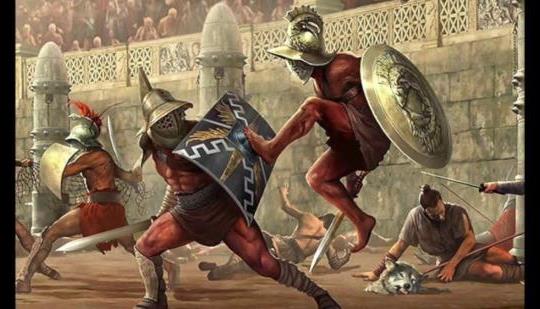Deep Roots
It’s the year 1997. In the wake of an alternate World War II outcome, Japan rises from the ashes as a fascist state known as the Republic of Greater East Asia. The Republic, while purporting to research military survivalism, methodically instills fear in its citizens by kidnapping a randomly-selected group of high school students, dropping them off in a remote location, and forcing them to battle it out over the course of three days, until only one is standing. Each of the students are geared with only a survival pack and a random weapon, with a single notion in mind – kill, or be killed.
Does this perspective sound vaguely familiar to you? If your first thought reflected towards movies such as The Hunger Games, or games such PlayerUnknown’s Battlegrounds or Fortnite: Battle Royale, this is with good reason. The roots of the recent worldwide phenomenon that has come to be the Battle Royale gaming genre can be traced back through various games, mods, movies, manga series, and novels, all the way back to at least the 20th Century, and maybe even further. In case you’re new to the Battle Royale genre (where have you been?), the standard Battle Royale game/mode features a last-man standing mode with a large map constrained by a shrinking play space and up to 100 players, testing your ability to scavenge gear and fight for your life in an intense free-for-all deathmatch.
The above scenario comes from Japanese novel, Battle Royale, which was written in 1996 and finally published in 1999. Brendan Greene (known by his online handle, PlayerUnknown) borrowed some inspiration for his development of PlayerUnknown’s Battlegrounds (PUBG) from the novel’s concepts, including the term Battle Royale, which is the name Greene used to coin his original mod for DayZ (more on that later) that would eventually lead him to the creation of PUBG.
Recently, Greene posted a tweet reflecting on the monumental success that’s followed since he “created the Battle Royale mode 5 years ago[,]” and immediately, I wondered, did the genre really start with him? Can we trace it back further? Can only one person truly deserve sole accreditation for the birth of this craze?
“When I created the Battle Royale game mode 5 years ago, I hoped one day it might work as an esport. Tomorrow we get to see some of the best @PUBG players in the world compete in the #PGI2018 at the @MBArenaBerlin! For me, this is a dream come true! Once again, thank you all”
— PLAYERUNKNOWN (@PLAYERUNKNOWN) July 24, 2018
After way too much research and coffee, we’ve meticulously broken down the entire history of Battle Royale in an effort to get to the bottom of who really created the genre, and we found out just how deep its roots really are. So, buckle up and prepare yourself for quite the history lesson. Then, we’ll leave you with our predictions for the future of the genre and discuss whether we think it’s here to stay or not.
Royale Goes Back – Way Back
As mentioned above, the concept of dropping a group of people on an island with little to no gear to fight for survival has been around since at least the 20th century, when Japanese author Koushun Takami released his first novel, Battle Royale, shortly after leaving his career in journalism. Not long after, the book was adapted into a film (with a sequel), a couple of manga series, and according to the LA Times, was almost picked up by The CW for an American broadcast TV show adaptation – now may be the best time to revisit the idea!
As far as popular culture goes (outside of a few adaptations that don’t affect the timeline), we don’t see much else on the Battle Royale concept after this, until famed author, Suzanne Collins, surged the concept back into the limelight with a trilogy of novels that went on to be adapted to well-received motion pictures by Lionsgate Entertainment, The Hunger Games trilogy. However, Collins didn’t pull any inspiration from the Japanese novel/films. Instead, she says she got her inspiration from more classical sources – the Greek myth of Theseus and the Minotaur, and, of course, Roman Gladiators. Collins pulled three key elements from these sources to put together her idea for the book: an all powerful and ruthless government, people forced to fight to the death, and the game’s role as a source of popular entertainment.
So, if Collins didn’t pull any inspiration from the Japanese Battle Royale, then where does The Hunger Games fit into this timeline and how does this all play into Battle Royale as a gaming genre?
The missing links? – Minecraft and Brendan Greene. But before we get into it, be sure check out the timeline graphic below to help you follow along as we dive headfirst into the deeper part of the history! I’ve broken the timeline into four phases; the first phase represents the modern conception of Battle Royale (Red), the second phase represents the birth of the gaming genre (Tan), the third phase represents the first official Battle Royale game releases (Blue), and the final phase represents where the genre is at now and leaves open what’s to come next, whatever it may be! (Green)
Confused Yet?
A few years before the first The Hunger Games motion picture was released, but a year after the book was initially written, an open world, military simulation game developed and published by Bohemia Interactive for Windows, Arma II, was released. Arma II, much like its predecessor, received extensive modding support from both the community and its developers. Utilizing such open-ended developing tools and his own knack for video game design, New Zealand video game designer, Dean Hall, released DayZ, a critically acclaimed and best seller survival horror modification to Arma II, which went on to receive monumental success.
Branching off from the DayZ mod to Arma II, video game designer, Brendan Greene (known better by his online handle, PlayerUnknown), developed DayZ: Battle Royale, which contained most of the features seen now in almost every current Battle Royale game today. Greene pulled his interest in the genre both from The Hunger Games and, wait for it. . . Japanese Novel and Film Adaptation, Battle Royale (saw that coming, right?). He ultimately steered away from any likeness to The Hunger Games to avoid any potential intellectual property issues, which landed him in front of the now iconic (and mentioned about a million times in this article) phrase, Battle Royale. Greene continued to support the DayZ mod well into the days of Arma III, after DayZ went on to release as a standalone title, and was then eventually licensed as a consultant by Sony Online Entertainment to help develop H1Z1, another standalone Battle Royale title. After his consultation ended, Greene was contacted by and ended up with South Korean company, Bluehole Ginno Games (now renamed PUBG Corporation), a subsidiary of Bluehole Inc., where he and the team developed and finally released the standalone title, PlayerUnknown’s Battlegrounds, to early access release in March of 2017.
So, Who Created Battle Royale?
I hate to sidestep and give you all the lawyer answer on this, but me being in law school, at least it’s warranted – it depends. Really, more than one person can be accredited for the concept. The phrase, Battle Royale and its current concept was undoubtedly created (or at least first recorded to a medium of expression) by Koushun Takami in or somewhere around 1996. Elsewhere in the world, and seemingly unbeknownst to that, author Suzanne Collins then resurfaced the concept into popular culture with the critically acclaimed The Hunger Games trilogy, which instead borrowed from classical tones of Romanism and Greek Mythology.
Not long after her book was released and adapted to film, video game developers drew bored of repetitive online multiplayer and sought to remedy the solution with large maps and player counts, random weapon spawns, and free-for-all last man standing rules. Dean Hall pioneered the modding community with DayZ, Separately, Minecraft players sought inspiration directly from The Hunger Games and sought to recreate the experience with server plug-ins. Brendan Greene, who pulled inspiration from both The Hunger Games and Battle Royale, reimagined DayZ into the mod that ultimately opened the floodgates to the genre, DayZ: Battle Royale.
Greene then eventually went on to establish PUBG Corporation and officially release PlayerUnknown’s Battlegrounds. Meanwhile, various Battle Royale style games began to sprout from virtually everywhere, including The Culling and Ark: Survival’s added mode, Survival of the Fittest. Later in 2017, Epic Games saved its underwhelming title, Fortnite, by adding the free-to-play mode, Fortnite: Battle Royale, which of course changed gaming as we know it. THAT, (drumroll please), is the history of Battle Royale.


